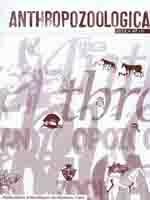The grazing snake: weeds and snakes in Greek and Latin literatures
Lots of plants had names derived from the name of snakes in Antiquity. This fact can be connected with numerous legends or tales concerning snakes who eat grass or herbs, especially medicinal herbs. Particular notice should be taken of some testimonies about snakes whose temperament is modified by the herbs they are supposed to eat. Still, all this does not tell us why the Ancients have thought that snakes can eat plants; two different kinds of arguments can be brought to bear: first, the scattered elements of a theory of venom and temperament have played a part; secondly, Aristotelian texts show that the Ancients were aware of the fact that snakes eat preys that are very bulky compared to their own size, and this observation led them to lend to the snakes the reputation of being gluttonous. They have been henceforward believed to be able to eat anything, including grass. As a conclusion, we try to reflect on the implications of what is for us an example of an “impossible biology”, the like of which are not seldom in Ancient Science.





